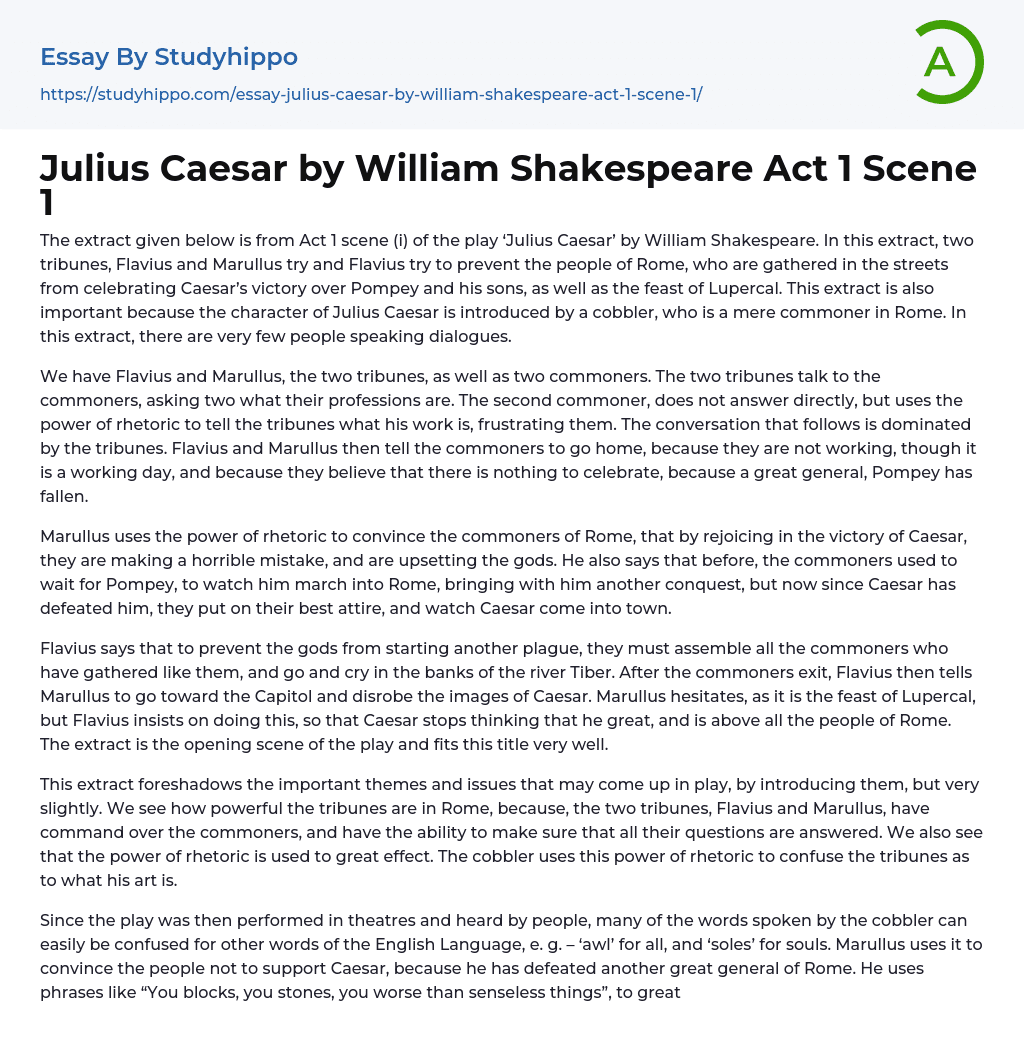

Julius Caesar by William Shakespeare Act 1 Scene 1 Essay Example
The following excerpt is from Act 1 scene (i) of William Shakespeare's play 'Julius Caesar'. In this passage, two tribunes named Flavius and Marullus attempt to stop the citizens of Rome, who have gathered in the streets, from celebrating Caesar's triumph over Pompey and his sons, as well as the Lupercal feast. This passage is significant as it introduces the character of Julius Caesar through a conversation with a cobbler, a common citizen in Rome. It is worth noting that there are only a few speakers in this particular excerpt.
The text explains that there are two tribunes named Flavius and Marullus, along with two commoners. Both tribunes inquire about the professions of the commoners. The second commoner employs rhetorical tactics to indirectly reveal his occupation, frustrating the tribunes. The subsequent conversation is dominated by the tribunes. Flavius and M
...arullus then instruct the commoners to leave and return home since they are not working despite it being a workday. Additionally, they believe that there is no cause for celebration due to the recent demise of Pompey, a renowned general.
Marullus utilizes the power of rhetoric to persuade Rome's commoners that their celebration of Caesar's victory is a grave error, one that angers the gods. He further observes that previously, the commoners would eagerly await Pompey's arrival in Rome, witnessing his triumphant procession and another conquest. However, now that Caesar has emerged victorious, they don their finest clothing and eagerly await his entrance into the city.
Flavius suggests gathering all the commoners who have congregated and going to the river Tiber to cry in order to prevent the gods from causing another plague. After the commoners leave, Flavius instructs
Marullus to go to the Capitol and remove the images of Caesar. Marullus expresses hesitation due to it being the feast of Lupercal, but Flavius insists on this action to humble Caesar and remind him that he is not above the people of Rome.
This passage serves as the opening scene of the play and suits its title perfectly.
The following passage introduces and subtly hints at the important themes and issues that may arise in the play. It showcases the considerable authority held by the tribunes in Rome, Flavius and Marullus, who have influence over the commoners and possess the capability to ensure their queries are addressed. Furthermore, it highlights the effective use of rhetoric. The cobbler employs this rhetorical power skillfully, causing confusion among the tribunes regarding his craft.
When the play was performed in theaters and heard by people, many of the words spoken by the cobbler can be easily misinterpreted as other English words, such as 'awl' for all, and 'soles' for souls. Marullus seizes this opportunity to persuade the people not to support Caesar, highlighting that he has defeated another prominent Roman general. His effective use of phrases like "You blocks, you stones, you worse than senseless things" convinces the commoners that their current actions are incorrect and causes significant discontent among many.
The conflict and conspiracy in the play become evident as the two tribunes express their opposition towards Caesar and his ideals, while the commoners present there show strong support for him. Caesar is portrayed by the cobbler as an ambitious general who has defeated Pompey, but it is clear that not everyone in Rome likes him or
supports him, as evidenced by Flavius and Marullus' lack of support.
The Romans who are part of the lower class are depicted as changeable individuals who swiftly shift their allegiance from Pompey to Caesar once the latter prevails over the former. This characteristic can have significant implications later in the play as one of the main characters can exploit this trait of the people, manipulating them into thinking that their actions are justified.
Tradition also has a significant impact on the outcome of the play. For instance, even someone like Marullus refrains from disrobing Caesar's images due to the Feast of Lupercal. Additionally, there are contrasting attitudes displayed by Marullus and Flavius, wherein they show support for Caesar in his presence but freely express their true thoughts when away from him. This dynamic is crucial in the play as Caesar must discern which of his tribunes and followers may be against him.
Ambition is evident as an important aspect in the play, as Caesar demonstrates his dominance over Pompey to establish his superiority. The extract also highlights the significance of politics in Rome, depicting how various generals vie for public support and then exploit it. These elements foreshadow the numerous themes and issues that may arise in "Julius Caesar".
- Ancient Rome essays
- Augustus essays
- Byzantine Empire essays
- Julius Caesar essays
- Mark Antony essays
- Roman Republic essays
- Aldous Huxley essays
- Alice Walker essays
- Amy tan essays
- Anne Bradstreet essays
- Anton Chekhov essays
- Arthur Miller essays
- Augustine essays
- Bertolt Brecht essays
- Booker T Washington essays
- Carol ann duffy essays
- Charles Dickens essays
- Charlotte Perkins Gilman essays
- Chinua Achebe essays
- Christina Rossetti essays
- Consider The Lobster essays
- Edgar Allan Poe essays
- Elizabeth Bishop essays
- Emily Dickinson essays
- Ernest Hemingway essays
- F. Scott Fitzgerald essays
- George Orwell essays
- Harper Lee essays
- Homer essays
- James Baldwin essays
- Jane Austen essays
- John Donne essays
- John Steinbeck essays
- Kate Chopin essays
- Kurt Vonnegut essays
- Langston Hughes essays
- Leonardo Da Vinci essays
- Mark Twain essays
- Mary Shelley essays
- Maya Angelou essays
- Nathaniel Hawthorne essays
- Oscar Wilde essays
- Percy Bysshe Shelley essays
- Peter Skrzynecki essays
- Phillis Wheatley essays
- Poets essays
- Ralph Waldo Emerson essays
- Ray Bradbury essays
- Richard Rodriguez essays
- Robert Browning essays



